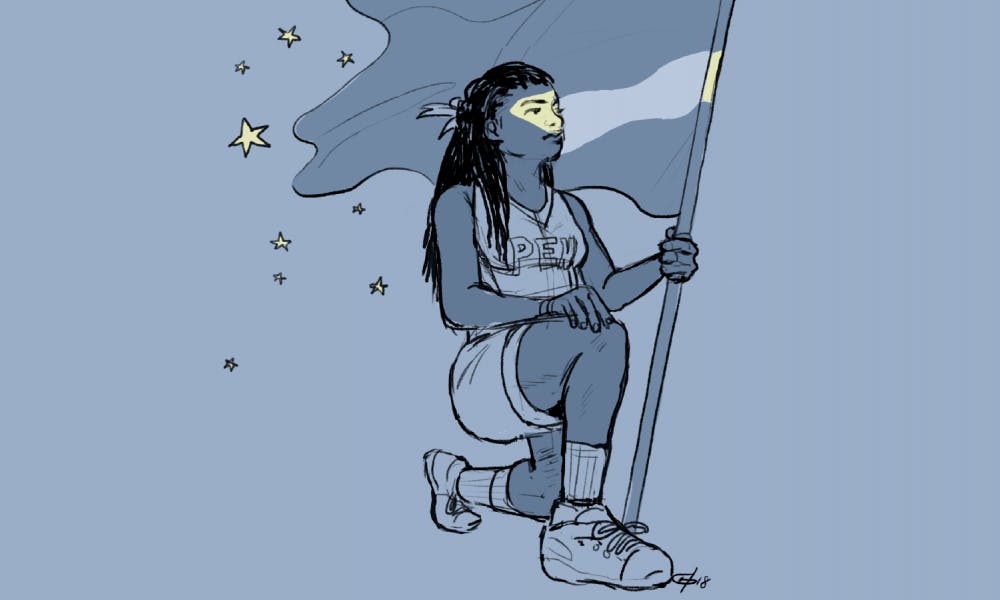
During the 2016 football season, a pair of Penn cheerleaders made headlines by kneeling during the national anthem, joining the nationwide protest inspired by then-49ers quarterback Colin Kaepernick. At the time, one of the cheerleaders, then-junior Alexus Bazen, told The Daily Pennsylvanian, "I believe that the climate of the world right now is very hostile. All over the news there has been brutality and violence against people of color and I truly believe in … fighting for equality and standing up for what I believe in." More than a year after the initial protests, Bazen reflects on why she chose to make the move and what type of progress she feels the nation has made since.
_____________
This past Martin Luther King Jr. Day, I stayed home and made a day of online activism as my yearly personal service project. In between drafting letters and emails, leaving voicemails, and making anonymous donations to various campaigns, I periodically scrolled Facebook, Instagram, and Twitter, perusing posts of community projects, sorority events, and various friends and family enjoying the snow on their day off.
I soon became annoyed, as I noticed that almost all the content directly celebrating Dr. King was insultingly cliché. Various black and white pictures of him situated in deep thought littered my timeline, each with one of the same three or four cherry-picked quotes, poorly spliced from his work and devoid of any context, pasted on the background — I too was guilty of following suit. However, as these proverbs swirled around my feed throughout the day and into the night, I found it problematic that many of the posts had captions and hashtags that took aim at protesters and activists, claiming that their actions have caused much of our nation’s racial, ethnic, religious, and economic discord.
Martin Luther King Jr. was most certainly a man of peace and unity, but it is both disrespectful and insulting to his legacy as a warrior for social justice to misuse his words to silence and invalidate the experiences of marginalized groups with systematic violence, police brutality, microaggressions, and the daily struggle for intersectional equality in all spaces. King himself participated in peaceful protests, and I cannot help but draw parallels between those same individuals who persecute Colin Kaepernick and others who chose to kneel (but ironically use Dr. King and his words as tools for deflection and victim blaming) and the individuals who assaulted, mocked, and criticized Dr. King and the members of the Civil Rights Movement for their protests.
Since September 2016, I have knelt during the national anthem during Penn football and basketball games. I have been asked numerous times about why I choose to protest by friends, teammates, and strangers, especially as a cheerleader. As a Black woman who grew up in a lower-income household, too often, I witnessed family and members of my community fall victim to financial and political snares that trapped them in vicious cycles of economic and social poverty.
As a student here at Penn, I possess both the privilege and platform to draw the attention of the masses to issues that plague many disadvantaged communities in this country. As an athlete and campus ambassador, I choose to take advantage of my heightened visibility to bring attention to the plight of minorities, immigrants, poor people, and others who are called Americans but are treated worse than criminals.
A hallmark of kneeling as protest is humility. I am quiet, my head is slightly down, and often my eyes are closed. In assuming this vulnerable but defiant position, I am silently refusing to acknowledge the false representation of unity and nationalism that the flag symbolizes. The action of protest neither causes nor perpetuates racism and discrimination. It brings attention to villainous individuals, groups, and policies that have worked to suppress the very existence of many people in America.
Ignoring evil will only encourage it to continue, a philosophy Dr. King himself believed.
In his essay “Autobiographical Notes,” James Baldwin, an iconic African-American author, poet, activist, and philosopher during the 20th century, wrote, “I love America more than any other country in the world, and for exactly this reason, I insist on the right to criticize her perpetually.”
Not only will I continue to criticize America, I will fight to upheave and reconstruct the systems in place that have allowed this republic to legally and unapologetically oppress its citizens.
I continue to encounter vitriol from those who refuse to see beyond their own prejudices to educate themselves on the injustices being done to their very neighbors. I am constantly told that by refusing to give the flag and anthem anything other than my full physical attention, I am disrespecting the soldiers and veterans fighting to protect that republic under that flag.
Since the American Revolution, Black soldiers have laid down their lives to maintain freedoms and liberties that they themselves were not even afforded. They were mistreated by their superiors, called racial slurs, had their equipment damaged, were pushed to the back lines, and were ultimately dehumanized, afforded nothing but the ultimate disrespect while making the ultimate sacrifice.
As a descendant of several generations of Black veterans who served in every branch of the U.S. Armed Forces, I am a witness to the relationship between the symbol of the flag and the veterans who fight for it.
So yes, if Martin Luther King Jr. were alive to see the violence committed against people of color, people who are poor, and immigrant bodies, I believe he would join me, Kaepernick, and the rest us who fight daily against injustice, on one knee.
Alexus Bazen is a College senior and a Penn cheerleader. Comments on her column can be directed to dpsports@thedp.com.
The Daily Pennsylvanian is an independent, student-run newspaper. Please consider making a donation to support the coverage that shapes the University. Your generosity ensures a future of strong journalism at Penn.
Donate



